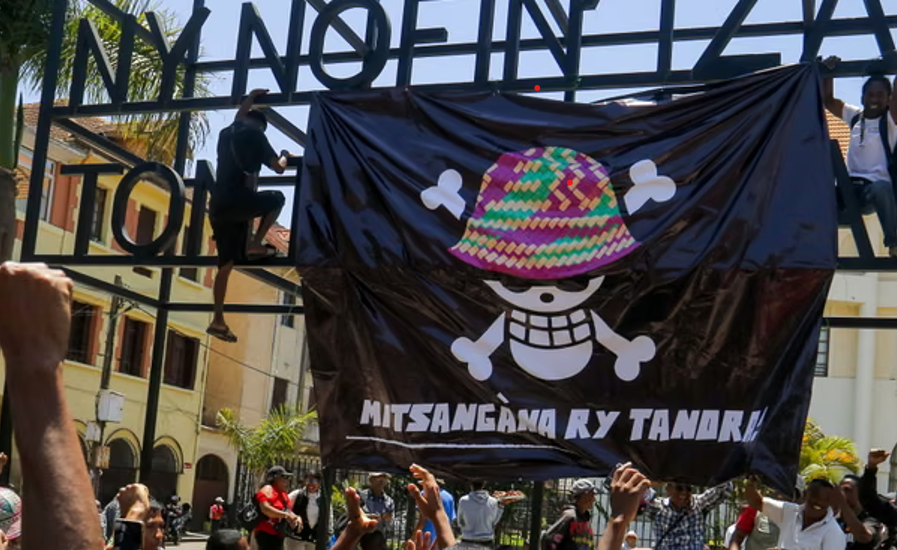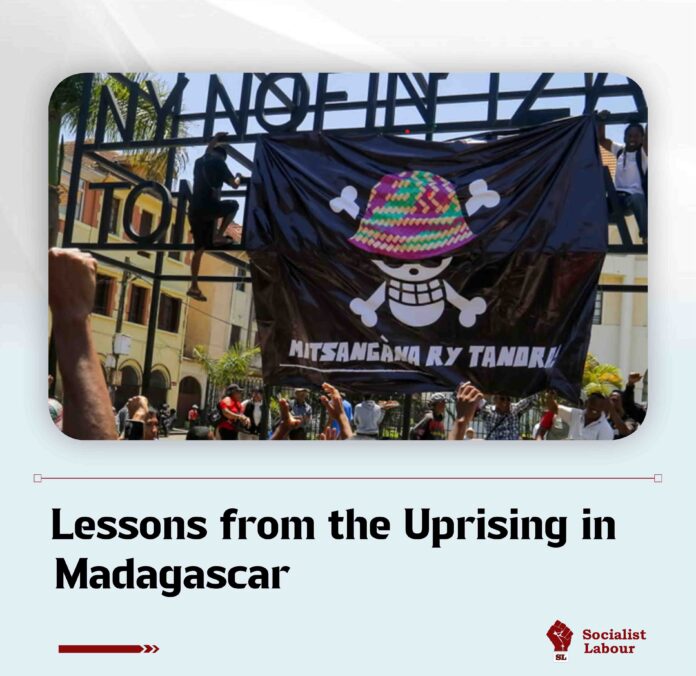The successful uprising in Madagascar to remove the national president should give confidence and inspiration to all socialists. This is just one example of the multiple popular uprisings that are taking place across the world. The symbol adopted by the protesters in Madagascar is the pirate flag, taken from a Japanese comic strip and used in Indonesia in August and the Philippines in September, with the addition of a local hat:
Flag flying at 13 May Square in the capital of Madagascar (equivalent of Eagle Square in Abuja)

Protests are still progressing in Morocco on the opposite side of Africa. Our role is to encourage similar events locally. As with all high points in the class struggle, there are several other important lessons that we should all learn or re-learn from the successful mass struggles in Madagascar.
The protests may have been headlined by the youth of Gen Z, but the organized working class also played a prominent and vital role. The initiators of the movement emphasized the inclusive nature of their action: “This struggle concerns you and your daily life. It concerns all people,” they declared.
By the 1st October, less than a week from the start of the protests, calls for a general strike were being made and echoed by the participants. Classes at the main, Ankatso University, were immediately suspended. By the 9th October, almost no teachers went to work in at least two large high schools in the capital.
They were joined, for example, by medical interns on the streets of Antananarivo and other large cities. Some had already been mobilized for several days, demanding an increase in their benefits and the renovation of hospital infrastructure. Thus they and other public sector workers were generalising the protest demands beyond those for regular water and electricity.
The country’s main trade union platform, Malagasy Trade Union Solidarity, officially joined the movement. On October 1, it called for a general strike and daily demonstrations, openly demanding the resignation of the head of state. This federation brings together around fifty unions, including those representing teachers, healthcare workers, and customs officers.
The demands are multi-pronged. On the social front, the unions are demanding an increase in civil servant salaries, which have been frozen since 2022 despite annual inflation exceeding 8%. On the political front, they denounced a deterioration in the rule of law, the decline in trade union freedoms and the repression of protesters.
For its part, the country’s largest teachers’ union, Sempama, was also calling for a general strike in response to the lack of resources allocated to the education sector. “Teachers who graduated from the École Normale Supérieure to teach in high schools have still not been hired since 2021 due to a lack of funding for their salaries,” worries its president.
Major private-sector industries, including textiles, banking, telecommunications, and mining, may generally not have followed suit and the main private sector trade union federation called for dialogue rather than protest or strikes. No significant production shutdowns or closures were recorded in the key sectors of the Malagasy economy.
However, on 15th October, the head of the national airline company resigned rather than face a growing protest by staff of the airline. His decision follows a protest by a group of flight crew members, who announced their refusal to carry out his directives.
Governments and the bosses can usually face down a street protest, but action by trade unionists undermines their economic power and so is far more serious. In Madagascar, the President tried repression, killing at least 22 protesters, before the uprising spread and he was forced to flee the country to his house in Dubai.
The leadership of the movement in Madagascar may have been anonymous, but as with all significant protests there were local organizers. The movement did not just suddenly happen. There was a core group of organisers some of whom met regularly and used social media to call thousands on to the streets and encourage trade union members to raise their own demands. A journalist who met with some of the leaders was able to report:
For several weeks, the movement’s main leaders lived between the extreme violence in the streets and the fear of being identified outside the protests, which could have led to arrest and possibly torture. Meetings were held in safe houses, closed restaurants and parish halls, vanishing as soon as decisions were made. During that time, a young man – let’s call him “A” – was “on the front lines,” as he put it without irony, tasked with organizing confrontations with law enforcement.
The role of the army, as always, is contradictory. The one army unit with a base in the capital, CAPSAT, was able to call for an end to the shootings by the police etc and open up the main square in the middle of the city to the protesters on 11th October. But on the other hand, its leader has now been sworn in as the countries new President.
At first he was saying that a civilian government would be initiated within days, but then said that elections would be held within perhaps two years – indicating his plans for an extended period in power. An activist who attended the demonstrations on 11th October said she was concerned about the involvement of CAPSAT, due to their role in the 2009 coup that brought the former national president to power. She also criticised politicians who made brief addresses to the crowds in front of the city hall as “opportunists”. “That’s why I’m not rejoicing at all, because all of those people gravitating around this ‘event’ are all dangerous,” she said.
Ideally in these circumstances, we needed a mass socialist organisation that could have helped to build workers councils (see article on page 2 of the October issue of our Socialist Bulletin). In its absence the challenges are to stop the military consolidating its power, to continue the protests and to encourage different groups of workers to take action to achieve their own demands. Socialists would be able to argue that all workers should use their new found confidence to win their own demands and move the balance of power in their workplaces from the bosses to the workers.
A significant socialist party would help to generalise the demands from the original ones around electricity and water. It would also help to try to overcome the differences and unevenness across the working class and wider population, for example the differences in approach of the public and private sector trade union centres. With the swearing in of a new president, it will be vital to argue that: “Lotta continua!!”, the fight continues.
We should all gain confidence and enthusiasm from the amazing struggles in Madagascar. The main lesson is the urgent necessity for us to build a socialist organization with significant influence across the working class and beyond. The best way to show our solidarity with the people of Madagascar is to build Socialist Labour!






